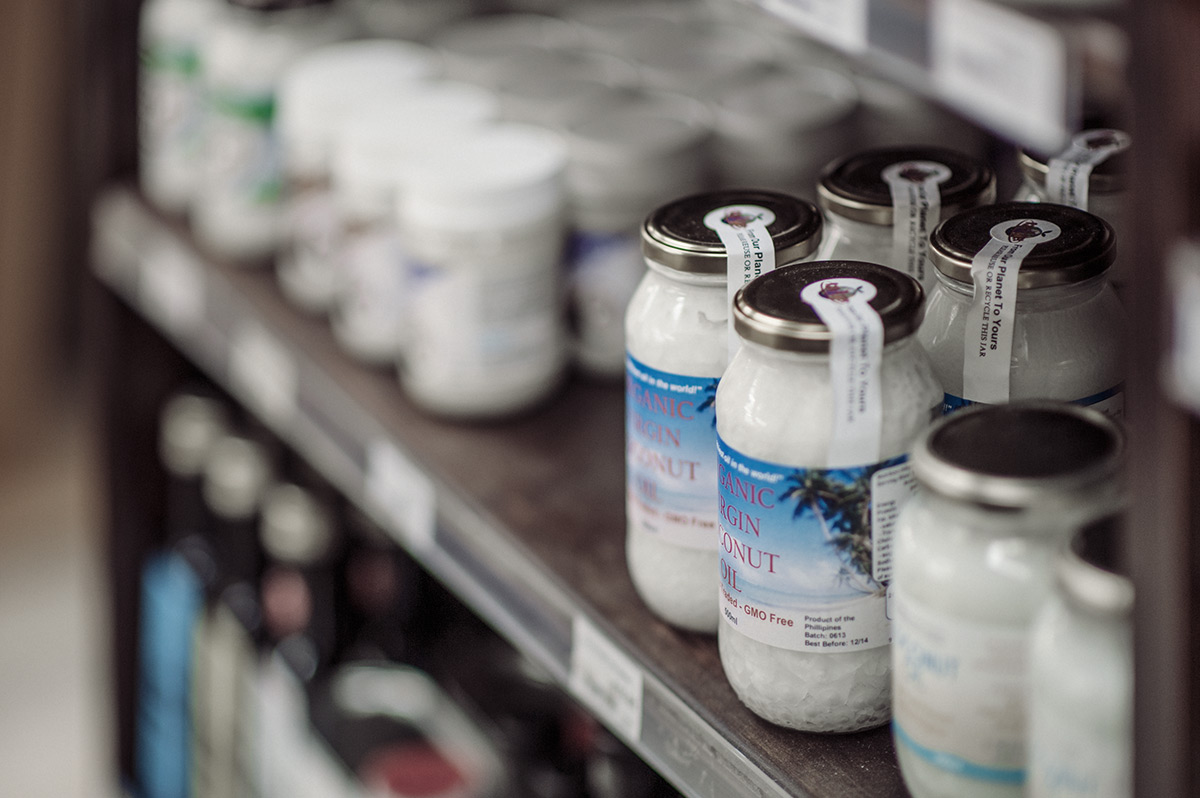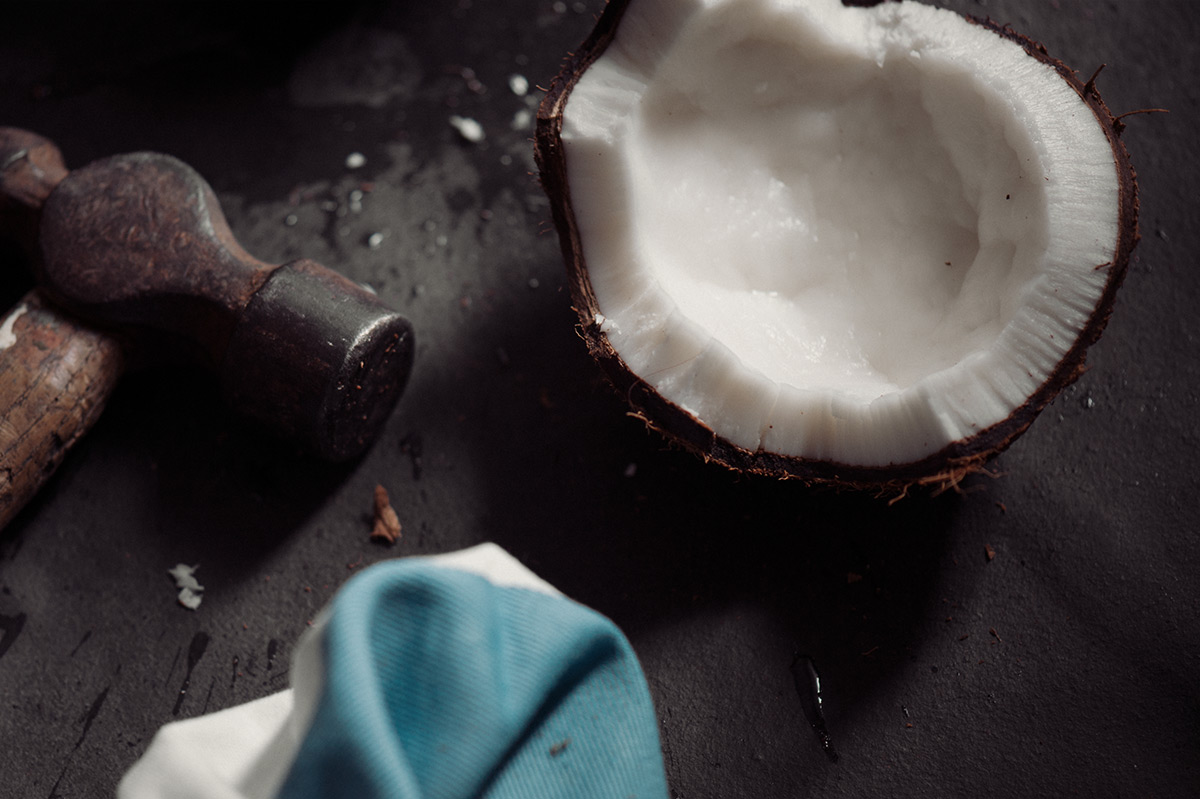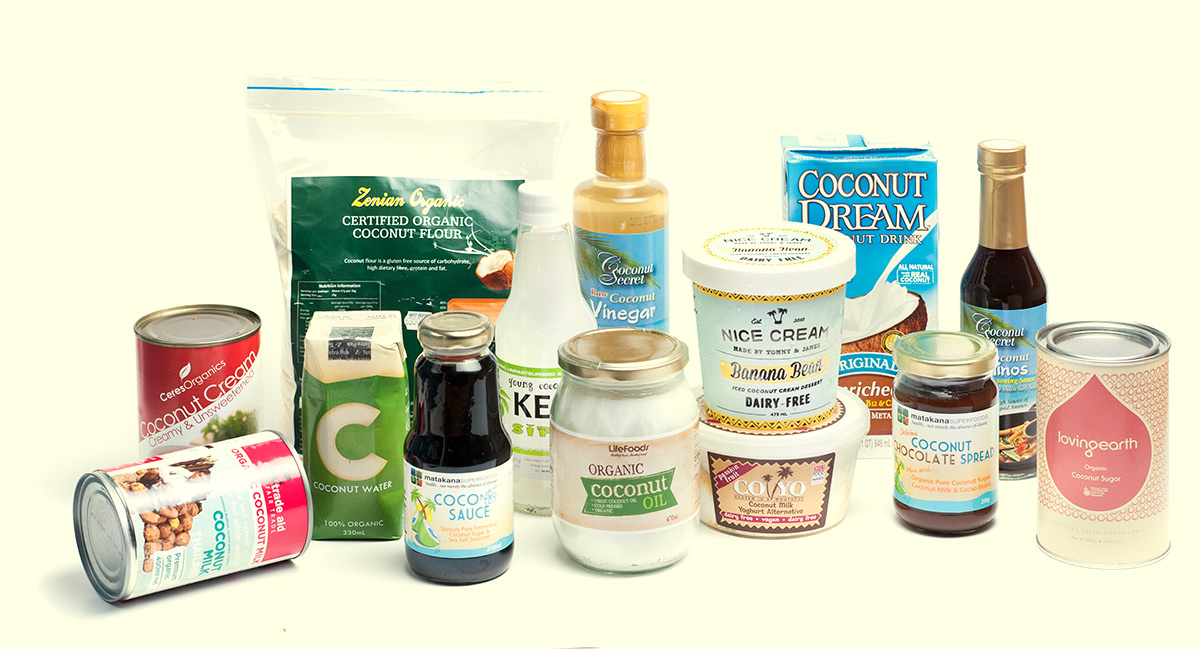
19—
Coconut Water

There is currently a lot of ‘hooplah’ about the amazing health-promoting properties of this member of the palm family. However, while the hype is new, coconuts and the traditional by-products of this ‘nut’1 (coconut milk, coconut cream and coconut oil) are not. The health benefits aren’t new either.

Technically there is no such thing as coconut oil. When people talk about coconut oil, what they’re really referring to is coconut fat. I will refer to it as oil for simplicity.
Coconut oil is good for you because:
IT Supports cardiovascular health
by normalising cholesterol levels
IT Enhances the immune system
by destroying disease causing organisms
IT Increases general metabolism
by promoting thermogenesis, and possibly by increasing the activity of the thyroid gland
IT Promotes healthy skin and hair
by acting as an antioxidant, and by helping to keep the connective tissue strong and supple
Coconuts contain the following health promoting substances:
Medium Chain Triglycerides (MCTs) induce thermogenesis. These chains of fat are utilised differently in the body to usual fats. They are quick to break down and be utilised by the body. Essentially MCTs induce thermogenesis, which is when fuel is burnt off as energy and heat rather than stored as fat.
Lauric acid and Capric acid enhance the immune system. Lauric acid gets converted to Monolaurin in the body, while Capric acid gets converted to Monocaprin in the body.
These beneficial compounds act as specific antivirals, antibacterials, antiprotozoal (kills parasites), and deactivate a number of fungi and yeasts.
Coconut oil gets converted into:
Ketone Bodies which may prevent Alzheimer’s. Coconut oil gets converted to ketone bodies in the liver. These ketone bodies travel via the bloodstream to the brain. This provides an alternative fuel to run your brain on, rather than it relying solely on glucose.

Why you should use coconut products
When used in moderation, saturated fat is good for you.
The fats that are bad for us are: transfatty acids/hydrogenated fats, deep-fried fats (oils heated to extreme levels & often reheated), and excessive amounts of Omega 6 fatty acids (especially when heated or hydrogenated).
Particularly if you are vegan
or have an intolerance to dairy or soy.
You’ll be excited to add the coconut yoghurt and the coconut oil to your diet. And perhaps some (occasional) coconut ice-cream.
If you currently over-consume dairy, or soy products.
You’ll be able to reduce your current intake by rotating 1-2 coconut products into your diet in order to reduce these food groups. This will help you to avoid food intolerance.
If you are overweight, you have a sluggish metabolism, or your immune system is challenged.2
The daily addition of full fat coconut milk, cream, or fat into your diet (for a few weeks) could help improve these conditions. You would need to do this in conjunction with a healthy diet and exercise regime.
Try using either:
1–2 Tbsp (15–30ml) of coconut fat, or
150ml of coconut milk or cream
There are several ways you can do this:
coconut oil (1–2 Tbsp)
Either use it to cook in, or add it to a smoothie.
If you feel like something a little more extravagant, try this from Home Grounds – coconut oil in coffee!
Or, this from Wellness Mama: Healthy mayonnaise
coconut milk or cream (150ml)
Use it as an alternative ‘milk’ in your own smoothie sensation, or try this one from stonesoupvirtualcookeryschool.com
These recipes all follow Lisa’s ‘Keep It Simple Sweetie’ (K.I.S.S) guide to eating!
Click here to read more.
Coconuts come from the same family as dates. Therefore, if you are also eating a lot of dates or date puree in your diet, you may be overdoing this food family, which could lead to food intolerance.

Why you shouldn’t use coconut products
Having a ‘deficiency in coconut’ is not the reason why some of us are overweight, have slow metabolic rates and poor immune systems!
Make sure to continue to focus on your Omega 3 oils (oily fish, walnut & flaxseed), and your Omega 9 oils (olive, avocado & macadamia). These fats contain Long Chain Triglycerides which are incorporated into your cell membranes to ensure your optimum health. For example they are used for cholesterol maintenance, immune system enhancement, blood pressure regulation, inflammation regulation and hormonal balance.
A wholefood is something you eat in its entirety. It hasn’t had anything removed or modified in any way – including being separated out (e.g. coconut water, coconut milk & coconut oil). Unless you are eating an actual coconut with all three of its components intact (carbs, protein & fat), it is not a wholefood.
Eating coconut in New Zealand goes against this theory. Coconuts are suited to the metabolic requirements of those living in tropical conditions. Where, for example, fat storage to insulate against the cold is not necessary, the hot climate would quickly deplete their energy levels and the ‘bugs’ that challenge their immune systems would be different.
For general good health, have either:
The equivalent of 1–2 Tbsp of oil no more than 2–3 times per week
or 1–2 servings of other coconut products no more than 2–3 times per week.1,2
If you’re going to plaster yourself in coconut oil on a daily basis (hair, face, and body), then I recommend that you consider limiting this food group in your diet (and vice-versa).
Don’t go into your local health food store (Huckleberry Farms or Harvest Wholefoods), to buy a coconut product, thinking that it will miraculously change your life. It should be one of the many marvellous goodies that you regularly purchase from these stores.

In addition to working at OOMPH-Realistic Holistic Health, I am a Naturopath, and Medical Herbalist for Huckleberry Farms (Auckland, New Zealand). Here I see all manner of food manufacturers come out of the woodwork to cash in on whatever the latest food fashion is.
Aside from the obvious forms (actual coconuts, and the obliterated variations thereof), at Huckleberry’s we currently have the following coconut products on the shelves:
kefir, water, milk, cream, oil (including a fermented variety), sugar, nectar, yoghurt, ice-cream, ‘non-soy’ sauce, vinegar, bread, flour, and there is also creamed coconut. That’s thirteen different options!
Note: Please be aware that this line-up does not represent what your diet should consist of! You should just choose the 1–3 options that suit you best.

Always buy your coconut products from a reputable health food store such as Huckleberry Farms or Harvest Wholefoods to ensure high quality.
Lisa Fitzgibbon is a degree qualified (2006), experienced and registered Naturopath & Medical Herbalist. She runs her own private practice – OOMPH in Grey Lynn, Auckland, New Zealand.
Lisa has been involved in the Natural Health industry for 16 years. She draws on her professional training and experience, as well as her own personal experience to bring you realistic, holistic health advice.
Book onlineCoconuts aren’t technically nuts – they are fruit. Even more specifically, coconuts are actually dry drupes.
It is advisable to consult with a qualified, experienced and registered Naturopath if you have weight loss, metabolic or immune concerns.
Although coconut is not metabolised like other fats, it is best taken with food to avoid upsetting your stomach. If you feel nauseated, your heart races, or you get diarrhoea from the consumption of coconut, then reduce your next dose and slowly build up. If this doesn’t work, simply avoid it.
Because coconut oil can promote weight loss, please consider this if you are already at a healthy weight, or are underweight.
Subscribe to LISA SAID SO
Subscribe to the LSS newsletter to get updates on a very irregular basis.
Sorry for the interruption!
You seem to be interested in what Lisa has to say. To be updated when new articles are published, or we have news to share, enter your email below. Thanks!